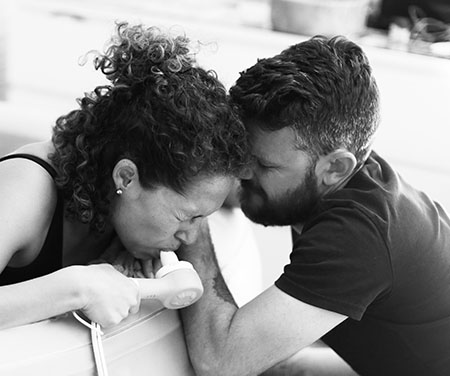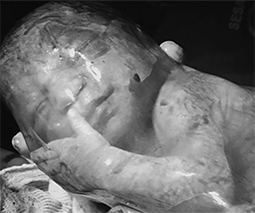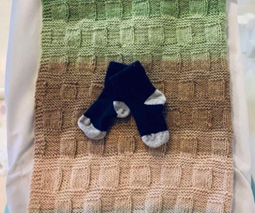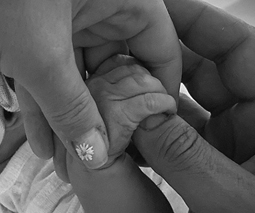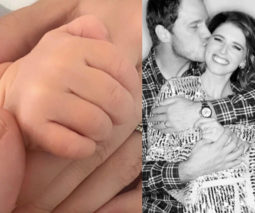The ultimate guide to surviving the first week at home with a newborn

The first week with a newborn can be nerve-wracking and intense. Once you leave the safe confines of the hospital, where you had midwives on tap for support and a listening ear if you needed to chat with a fellow mum, your new reality can really hit home once it’s just the three of you.
Beth Barclay, director of Mothercraft for Babies agrees. “Your home isn’t a controlled environment like the hospital is, and that can be daunting. Arriving home with your baby is also when the hard work starts.” Although you’ve thought about and planned for that amazing moment when you bring your baby home, it’s hard to really prepare for all that comes with motherhood. In that first week with your new baby, you’ll be recovering from whatever type of birth you had, figuring out how to make breastfeeding work, coping without much sleep and dealing with those rollercoaster hormones.
It’s going to be hard work alright. But this guide will help you keep your head above water while you get to know your newborn and find your motherhood feet.
Recovery from birth
Whatever type of birth you’ve experienced, it still counts as a physical trauma, which can take time for your body to recover from, so treat yourself kindly and go easy in the first week after the birth. Avoid heavy lifting and do your best to forget about housework or things you want to get done around the home, so you can get some much needed rest for your body to recuperate. If you’re worried about your to-do list, Beth suggests writing it all down. “If there’s things you’d love to get done every day, put a simple list together and stick it on the fridge. When family and friends ask you what they can do to help, ask them to choose something from the list.”
Recovery from birth can also be an emotional process, as the birth itself might not have gone the way you hoped. Because of this, you might have unanswered questions or feelings you need to work through, which can make a birth debrief something that would benefit you. Ask your visiting midwife or child and family health nurse about talking all this through with someone so you can move forward.
Breastfeeding
The first days of breastfeeding are critical for setting up your milk supply and a long-term, healthy breastfeeding relationship with your baby. “Give yourself every opportunity to establish supply,” says Beth. “Feeding your baby often will ensure that your brain receives all the right signals for lactation. You can expect to feed your baby around 8-10 times every 24 hours, and it’s normal for some of these feeds to be short and some to be longer.”
As much as breastfeeding can seem like a steep learning curve, try to trust that your baby and your body know what to do, as having a positive mindset is important in establishing successful breastfeeding. Expect to spend a lot of time feeding in the first week and beyond as your baby learns to suckle from you, which in turn helps to make sure your body is producing an abundant supply of milk. If you find breastfeeding painful or feel it’s not going well, book an appointment with a lactation consultant sooner rather than later, who can help get you on track.
Lack of sleep
Many women report that dealing with interrupted sleep in the first few days after having a baby is made easier by all the excitement and euphoria they feel after the birth. This can make you feel like a bit of a warrior in the first few days, but expect the exhaustion to hit soon after as your body catches up with everything that has happened. Your baby will need to be fed day and night which means getting up in the night to breastfeed will become a regular job for you for quite some time.
It’s not realistic at this stage to expect your baby to sleep for long stretches overnight, as newborns are biologically wired to wake up and need food and comfort throughout the day and night. You can make it easier on yourself by resting as much as possible during the day and avoiding any pressure to get your baby sleeping better. Ask your partner to help you with settling the baby after a feed in the evening so you can get your head down for a chunk of sleep. People will tell you to sleep when the baby sleeps, which isn’t always possible, but you should at least make sure you are relaxing when your baby sleeps, so don’t rush around getting things done during your newborn’s naps.
All the emotions
It’s normal to feel the whole gamut of emotions during the first week with your newborn, says Beth. “Having a baby is a huge adjustment and it’s normal to go through euphoria and delight to angst, overwhelm and frustration, plus all the emotions in between. It’s a time to be kind to yourself.” As well as this, many women experience the baby blues shortly after the birth, which is the result of a massive hormone surge combined with exhaustion and overwhelm as you adjust to your new role. Usually hitting home around day three or four, the baby blues could leave you feeling teary, fragile and moody. It’s not related to postnatal depression, so don’t be too concerned if your mood fluctuates in the first week or so. For most women, the baby blues moves on after a couple of days, but if you notice it hanging around for more than two weeks, let someone know, such as your GP or child and family health nurse. No treatment is usually required for the baby blues, other than plenty of TLC, rest and a good cry if you need it. It’s probably worth chatting with your partner in advance about how you’d like to be taken care of if you feel this way in the first week after having your baby.
Bonding with baby
Your baby might be sleepy and unable to talk to you, but there are still plenty of ways you can communicate and bond with your little bundle. Watch your newborn make eye contact with you and chat away so he can study your voice. Although your new baby might not be saying much, he is busy processing every new sight and sound around to help him learn about his new world and the people in it, especially you.
Beth also suggests plenty of cuddles and skin-to-skin time, which both you and your partner can enjoy. “After a feed is a great time to place your newborn on your or your partner’s chest, where baby will enjoy hearing your heartbeat,” she says. Cuddling your new baby on the couch also offers you an excellent chance for you to rest, so go ahead and enjoy the extended snuggle time. As the weeks go on, you can do as much of this as you like, because physical contact and affection is essential for your newborn’s development and wonderful for strengthening the emotional bond between the two of you.
Dealing with visitors
“Don’t feel pressured to have people visit you and your newborn right away, apart from immediate family,” says Beth. Although you’ll no doubt have people clamoring to meet and cuddle your new baby, visitors can be exhausting and they don’t always understand how hard it can be for new parents. Rather than feel pressured to shower and change to make yourself feel presentable, or have to worry about making cups of tea for your guests, you can suggest a date for visits when the three of you are ready for them, and not a moment sooner. Ask your partner to play gatekeeper if you need to, and let him explain to eager friends that you and bub aren’t quite ready for visits yet. Close family is different of course, because they’re more likely to be sensitive to your needs. Just ensure that any visitors are appropriately vaccinated and germ-free when they come by.
The first trip out
Not all new parents are ready to venture out into the world with their newborn during the first week, but if this is something you want to try, then the advice is to keep the outing simple and short. “The logistics of leaving the house in the first week can be overwhelming, so don’t put pressure on yourself if you’re not ready,” says Beth. “Keep the first trip simple, such as to the local park or a pram-friendly cafe, and make sure you feed your baby before you leave the house.” It’s also worth thinking about what you’ll do if your baby needs a cuddle, nappy change or breastfeed while you’re out.
Newborns have a way of sounding their needs urgently in the first weeks, so prepare yourself for a wail that builds itself up very quickly. Have a plan ready so you’re not caught short and likely to panic, such as a place you’ll feel comfortable to breastfeed or change your baby’s nappy. And if you’re not sure about braving the outside world just yet, use a baby carrier and try a walk around the backyard or veranda to get some practice in.
Need extra help?
If the first week with your newborn leaves you feeling shaken rather than settled, it’s totally okay to get some extra help in. Early motherhood is notoriously hard and too many women are reluctant to reach out for help that can transform the early weeks with a newborn in the best possible way. There are lots of services that can help, including your local child and family health centre, private mothercraft nurses, lactation consultants, postpartum doulas or parenting helplines. Remember, motherhood was never meant to be something done alone. In previous times women had their extended family and tribe to support them; these days women are expected to raise their babies alone once they’re partner returns to work. Reaching out for help means you’ll be able to enjoy your experience more and build your own village of support around you.
